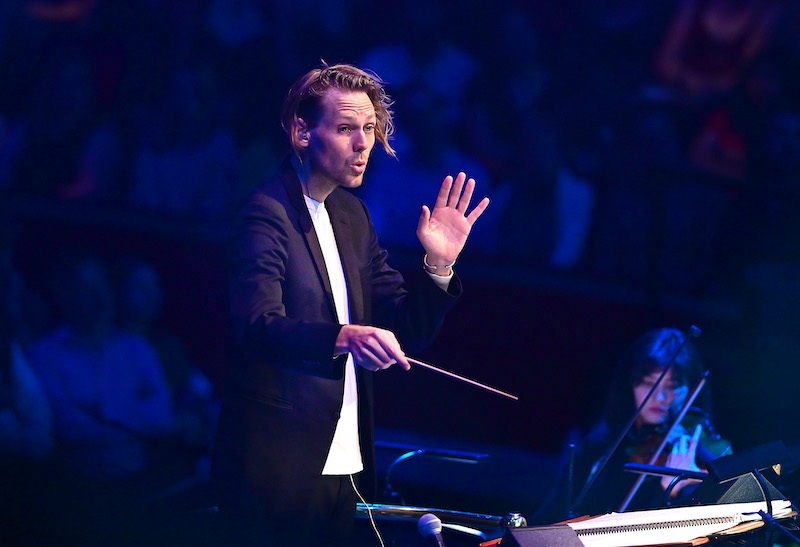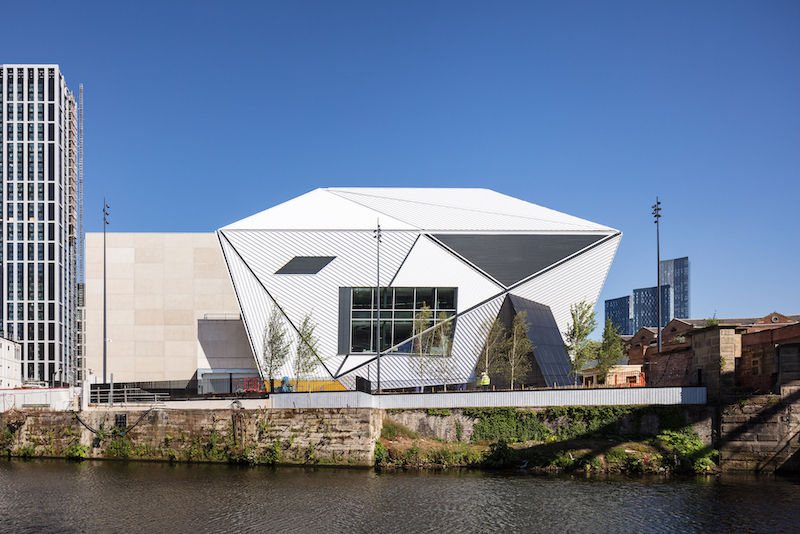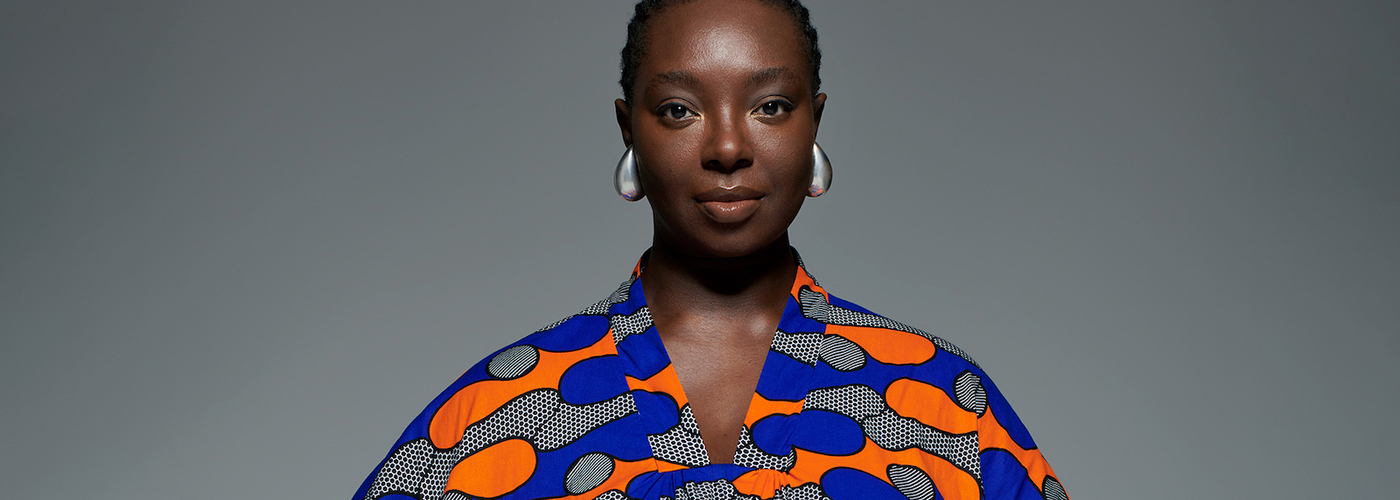The acclaimed music producer chats with David Adamson about her upcoming collaboration for Manchester International Festival and the changing face of club life in the city
AFRODEUTSCHE (aka Henrietta Smith-Rolla) is one of the UK’s most acclaimed dance music producers and DJs, with a string of commissions from the likes of BBC and the South Bank Centre under her belt. A resident of Manchester since moving in 2004 and now 6music regular host, she talks with David Adamson about her upcoming collaboration with Manchester Camerata for the MIF.
We need these intimate venues for music: safe, intimate, warm, inviting, grand but not elitist
David Adamson (DA): So, tell me about what people can expect from this new composition that you’ll be performing with Manchester Camerata for the MIF.
AFRODEUTSCHE (A): It's a combination of classical strings, live vocals, piano - and no one's ever heard me play live piano before, so this is a first - and there'll be electronics, too. It's really an opportunity to invite people into the world of classical music, because it's something that I've had a real passion for from when I was little but have never quite felt welcomed into.
I had the opportunity to write for the Camerata last year with a piece called He Sings Over Me, which they commissioned, and I got to know them in a way that meant that when I was writing this work for MIF, I thought, ‘who can I trust with my sound and my music?’ and it was the Camerata.
The show begins in digital candlelight, so this is my way of taking the audience back to when people would have listened to classical music by candlelight, which I think has something really inviting and settling about it. It's quite rare for people to see and hear classical music - I don't think it's something that everybody does - and I really wanted to make it accessible, so that the room is really brought into that space. Then it just progresses through time with electronics and more vocals and we've got Michael England doing visuals for the show. It’s really about a revelation of love and what that means to me, and just sharing that with everybody. It's extraordinary that I'm actually doing it. I'm shocked.
DA: How has your relationship with classical music informed you as a musician?
A: It was a sort of innate understanding of music. I listened to my mum’s classical records and had violin lessons on a scholarship until I was 11, but my dream was to write for an orchestra, not necessarily to play. I’ve since been diagnosed with autism, which wasn’t a shock, but it meant my world was very small and I’d hear everything all the time and be acutely sensitive to sound. I would hear patterns and it turned out these patterns were notes, a sort of language. So I somehow have this ability to write full pieces for full orchestras without being able to read music, so it's just an innate language that I understand. But I don't understand the language of notation, interestingly. The language is the music and every single human, no matter what you're into, understands classical music. Whether they enjoy it or like it is another thing, but they understand it, and that’s something I wanted to share.
DA: And the work is also a collaboration with the conductor Robert Ames?
A: Yes, and what's brilliant about Robert Ames is he loves electronic music, and makes it, but is so deeply talented in all things arrangement. Conducting is just the last point of the work when you collaborate with him. Because I can't read music, I will write everything, send it to him and he will orchestrate it and turn it into sheet music, because he also knows and understands the sonics of an orchestra and the sonics of electronic music in a venue. To combine those two things, and for a conductor to work with a click track - are skills that very few people have.
DA: So in terms of the venue, Aviva Studios, how has that been set up in terms of things like acoustics?
A: Without revealing too much, the setup is going to feel like you're in a theatre - that's how I’d describe it. I love the Bridgewater Hall, but often I fall asleep when I'm taken to things there and I believe it's because they have set the space so that it is so cosy that no matter what you're listening to, you will nod off. Although it’s a good kind of sleep because you're just surrounded by this music.
With this new venue the piano is going to be pretty much in the middle of the room, and the orchestra is going to be tiered around the piano. I'll be dotting and moving around the space and that's why it's going to feel a little bit more like a play or a performance is happening. It’s intimate rather than just face on, because that's the other thing that we need - we need these intimate venues for music; safe, intimate, warm, inviting, grand but not elitist.

DA: What led you to move to Manchester back in 2004?
A: Yeah, it was about 18 years ago this year. So I was living in London, and I was working at Deutsch Englische Freundschaft [music management company] for Moby, Röyksopp and The Knife. I was copying demos with The Knife that we launched in in the UK, and it was a high time. I didn't realise at that point that a lot of stuff was starting again and new stuff was emerging. I was surrounded by musicians and surrounded by the industry, but I wasn’t making music.
I had friends who lived in Manchester and I would come and visit them once a month, and it was just music, music, music. Then I got set up with a jazz musician who played at Matt and Phred's. We started dating and I would get the train from Euston on a Friday night, land at Piccadilly, walk down the hill into the Northern Quarter, go to Matt and Phred’s and eat pizza and listen to jazz. And I just thought, ‘I don't want to leave this place’.
I made friends with people who worked in bars, and so I started to become part of Manchester's Northern Quarter nightlife, but also met all these musicians, because in Manchester at that time everybody was friends with each other. There was people like Andy Scruff and DJ Woody, and everybody knew each other and was encouraging one another. I didn't know it was the beginning for all of us. So I kept coming back and then fell in love with this guy and thought, ‘I hate going back to London. I can't do it anymore’. Then I moved here, and we broke up, but I stayed here, because it’s the best city.

DA: I’m interested to know how you feel the place has changed. There seems to be less of the likes of Sankey’s in terms of the provision of late night music, but along with the explosion of Warehouse Project in the last decade these purpose built venues have also been cropping up.
A: I think the city’s been in a transient stage for quite a few years, before the pandemic, because there was this slow process of venues closing for no obvious reason, and I think that did make way for the Warehouse Project. They had done lots of work before the venues were closing, so they were established, but it did make a way for them to become more established in the city.
What that ends up doing is it kind of forces out promoters who are into similar music. Because if you play the Warehouse Project you can't play anywhere in a certain mileage or vicinity for a month, which is a general thing that a lot of big venues do, it's not unheard of that you would do that.
But I think the nature of the Warehouse Project as opposed to the nature of somewhere like The White Hotel is that spaces started to be used as venues as a reaction to places like the Warehouse Project. People wanted something that was a bit more intimate and less focused on numbers and crowds and more on being in a community of sorts. Whatever that is, it can be a very small community, but people have always looked for like-minded people in music, because we know that these venues aren't just venues for music, they’re venues to be around the people that you are comfortable with and can be yourself with.
So I think it'll be a really interesting next ten years because is there that need for that intimacy on the dance floor anymore? Or is it more that people, post pandemic, really want large crowds of people and they want to be in bigger, grander venues surrounded by people? Are we going to not want these more DIY venues? Are we going to seek more variety? Who knows. So I'm interested to see what the next ten years looks like because the past 20 years has seen the city transform. I love the architecture of the city. I love the skyline. I am shocked that I can walk through Hulme and I can see the city, because those buildings were not there, and suddenly you’re seeing the city take a different form.
I’ve got the sense that a lot of the spaces we would have occupied ten or fifteen years ago have been developed. These warehouse spaces with these amazing rooms where people would make studios and design their entire life around this 12ft square room. I don’t know if the city still has that.
I’m just really interested to see how things shift, because this is a city that shifts. We know that there are very defined eras of music in this city, but the next ten years will be so interesting. What’s going to happen in the city for music and art? Because culturally the city is thriving.
EDITOR'S NOTE - Warehouse Project were approached for comment regarding the mention of an 'radius/exclusivity clause' in relation to its policy when booking acts. No comment had been received at time of going to press.
AFRODEUTSCHE with Manchester Camerata conducted by Robert Ames takes place on 5 July at The Hall, Aviva Studios, Water Street.
To book tickets visit the MIF website
Header image credit: Pierre Debusschere
Read next - Preview: Opening day of the Manchester International Festival
Read again - Manchester restaurant & bar deals: July 2023
Get the latest news to your inbox
Get the latest food & drink news and exclusive offers by email by signing up to our mailing list. This is one of the ways that Confidentials remains free to our readers and by signing up you help support our high quality, impartial and knowledgable writers. Thank you!
















